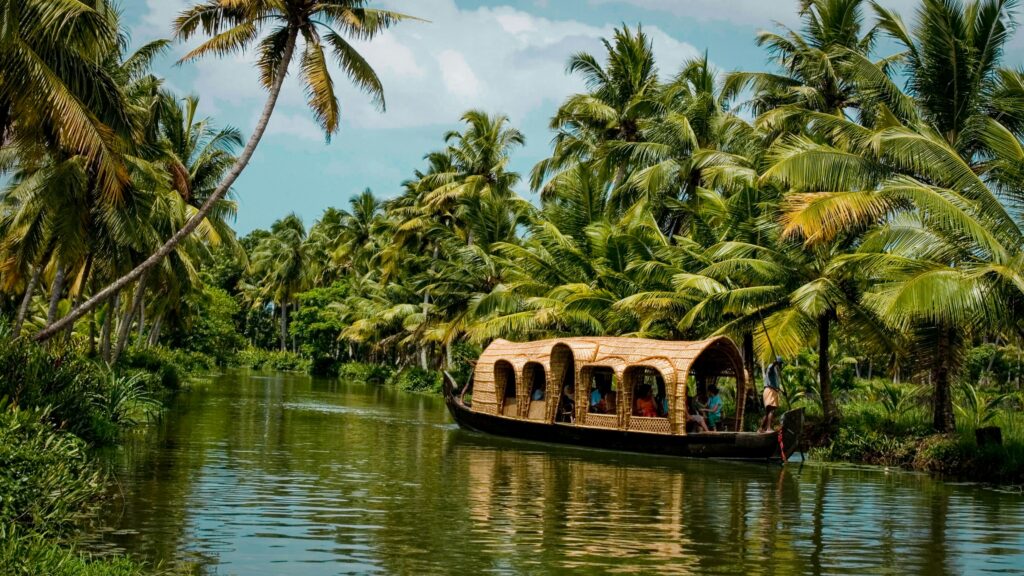Nestled in the southwestern corner of India, Kerala Tourism offers a refreshing escape into lush landscapes, tranquil backwaters, and rich cultural heritage. Often referred to as “God’s Own Country,” Kerala is a harmonious blend of nature, tradition, and modern hospitality. Whether you’re seeking relaxation, adventure, or cultural immersion, Kerala promises an experience that’s both soulful and unforgettable.
A Paradise of Natural Beauty
Kerala Tourism is synonymous with breathtaking natural scenery. From the misty hills of Munnar to the sun-kissed beaches of Kovalam, the state is a visual treat for every traveler.
- Backwaters of Alleppey and Kumarakom: Glide through serene canals on a traditional houseboat, surrounded by coconut palms and paddy fields. It’s a slow, meditative journey that defines Kerala’s charm.
- Hill Stations like Munnar and Wayanad: Carpeted with tea plantations and dotted with waterfalls, these highlands offer cool weather and panoramic views.
- Beaches of Varkala and Kovalam: Ideal for sunbathing, surfing, or simply watching the sunset over the Arabian Sea.
- Western Ghats: A UNESCO World Heritage site, home to diverse flora and fauna, perfect for trekking and nature photography.
The state’s commitment to eco-tourism ensures that these natural wonders are preserved and accessible in sustainable ways.
Rich Cultural Heritage and Traditions
Kerala Tourism also invites you to explore its vibrant cultural tapestry. The state has a long history of trade, art, and spirituality, influenced by Arab, Chinese, and European interactions over centuries.
- Kathakali and Mohiniyattam: Classical dance forms that narrate stories through expressive gestures and elaborate costumes.
- Temple Festivals: Events like Thrissur Pooram and Theyyam performances showcase Kerala’s spiritual fervor and community spirit.
- Traditional Music: Carnatic melodies and percussion instruments like chenda and mridangam add rhythm to daily life.
Visitors can also explore historical sites like the Mattancherry Palace, Bekal Fort, and Jewish Synagogue in Kochi, each offering a glimpse into Kerala’s multicultural past.
Wellness and Ayurveda Retreats
One of the most unique aspects of Kerala Tourism is its emphasis on wellness. Kerala is the birthplace of Ayurveda, the ancient Indian system of medicine that focuses on holistic healing.
- Ayurvedic Resorts and Spas: Found across the state, especially in places like Kovalam, Thekkady, and Palakkad.
- Therapies and Treatments: From Panchakarma detox to herbal massages, these treatments rejuvenate both body and mind.
- Yoga and Meditation Centers: Often nestled in nature, these retreats offer spiritual solace and mental clarity.
Many travelers come to Kerala not just for sightseeing, but for healing and self-discovery.
Culinary Delights of Kerala
Kerala Tourism is a feast for the senses—and that includes taste. The cuisine here is flavorful, aromatic, and deeply rooted in local ingredients.
- Appam with Stew: Soft rice pancakes paired with a creamy vegetable or meat stew.
- Kerala Sadya: A traditional vegetarian feast served on banana leaves, featuring over 20 dishes.
- Seafood Specialties: Fresh fish, prawns, and crab cooked with coconut, curry leaves, and spices.
- Malabar Parotta and Beef Curry: A popular street food combination that’s rich and satisfying.
Don’t miss the local desserts like Payasam, Ada Pradhaman, and Unniyappam, which add a sweet ending to every meal.
Responsible and Sustainable Travel
Kerala Tourism has made significant strides in promoting responsible travel. The state encourages eco-friendly practices and community-based tourism that benefits locals.
- Village Tourism Initiatives: Experience rural life through homestays, farming activities, and traditional crafts.
- Green Resorts: Many accommodations use solar energy, rainwater harvesting, and organic farming.
- Plastic-Free Zones: Tourist spots like Munnar and Thekkady actively discourage single-use plastics.
Travelers are encouraged to respect local customs, support small businesses, and leave minimal environmental footprints.
Spiritual and Religious Sites
Kerala Tourism also caters to spiritual seekers. The state is home to diverse religious traditions, including Hinduism, Christianity, Islam, and Judaism.
- Sabarimala Temple: One of the largest pilgrimage sites in India, dedicated to Lord Ayyappa.
- St. Francis Church in Kochi: The oldest European church in India.
- Cheraman Juma Mosque: Believed to be the first mosque in India, located in Kodungallur.
- Guruvayur Temple: A revered Krishna temple, known for its rituals and elephant sanctuary.
These sites offer peace, reflection, and a deeper understanding of Kerala’s spiritual ethos.
Best Time to Visit and Travel Tips
The ideal time to explore Kerala Tourism is between October and March, when the weather is pleasant and festivals are in full swing. Monsoons (June to September) are also popular for Ayurvedic treatments, thanks to the cool and moist climate.
Travel tips:
- Carry light cotton clothes and comfortable footwear.
- Book houseboats and resorts in advance during peak season.
- Respect local traditions, especially in religious places.
- Try local transport like ferries and auto-rickshaws for an authentic experience.
Conclusion: Why Kerala Tourism Should Be Your Next Destination
Whether you’re drifting through backwaters, sipping tea in the hills, or soaking in an Ayurvedic bath, Kerala Tourism offers a journey that nourishes the soul. It’s a place where nature and culture coexist beautifully, where every moment feels like a postcard, and where hospitality is not just a service but a way of life.
From solo travelers to honeymooners, families to wellness seekers, Kerala welcomes everyone with open arms and a gentle smile. So if you’re dreaming of a destination that’s serene, soulful, and stunning—Kerala is calling.

